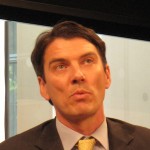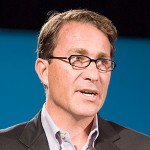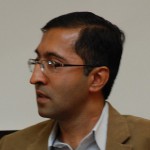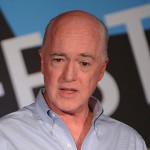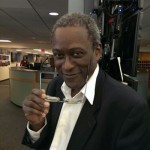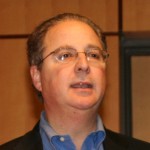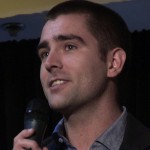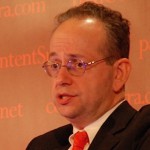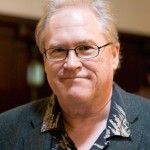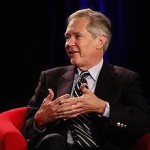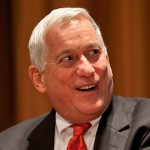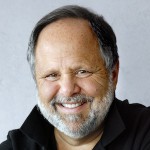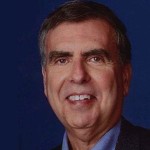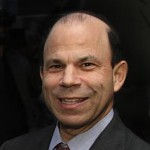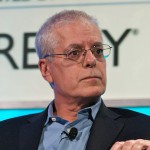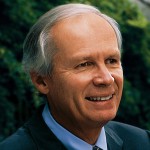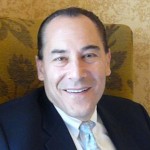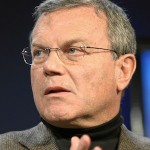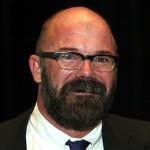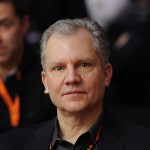BIO: YES: Sir Timothy John "Tim" Berners-Lee, OM, KBE, FRS, ...
TRANSCRIPT: Paul: This is Paul Sagan, it is April 11th 2013. I'm at CSAIL at MIT with Martin Nisenholtz and John Huey. In the office of Tim Berners Lee. Thanks for having us.
Tim: You're very welcome.
Paul: We're here 2013 but we want to go back a bunch of years. You're in CERN and you invent something. We were just at Nick Negroponte's office. He said to tell you, you had no idea what you were doing, meaning where this would all go, and how big the impact would be. [laughter]
Paul: What did you think you were doing, especially as it applied to the structure of the information, and the access to information broadly. Then we'll get to news and journalism later?
Tim: From the point of view of motivation, I was relieving a frustration, like I suppose, a lot of things are created. I was frustrated by the fact the fact that the web didn't exist. I was frustrated by the hoops I had to jump through to get information across the 'net. Frustrated by the fact that pretty much every memo that you dealt with in your working life even though you were given it on paper it was actually sitting on a disk somewhere. If all these things were sitting on disks somewhere, and all those computers were connected together [indecipherable 01:28] computers, what was wrong with this picture? Why weren't they all part of an abstract hyperspace? It was, to a certain extent, solving a problem. Particularly, the people I worked with at CERN, the teams would be teams of volunteers from different existing collaborations would collaborate on a little bit of software, for example.
Really what I was looking for was a space which was a very collaborative space very much of a read/write thing. The goal was to have something where, if you and I were working on a project we could develop the plans for it in the web. Every time you thought of something, then you'd put it in there, and I'd pretty much see it, so that you and I, our brains, would be in equilibrium, because we'd be in equilibrium with the web.
The idea was that you would be able to therefore add things and make links very easily so that the web would become a really up to date expression of our common knowledge.
Paul: Did you think about that in a consumer sense? Or a news sense? Or were you really thinking about it as an academic collaboration tool?
Tim: Well, it was universal. One of the things I had noticed about all the systems which had been designed for scientists, or for people working on the mainframe, or for people using PCs in administration or something, is they made assumptions about which limited availability. It was clear that this thing had to be universal, so hence the "U" in what is now URL. That was in fact Universal Document Identifier. The system had to be universal. Every computer had to be able to understand HTML. Every computer had to be able to talk HTTP. You had to be able to make a link to anything. The moment you had a list a class of things these are the things which the web was designed for, and these are not. Then you end up with an oil/water boundary and the web itself would cease to be functional. If you can't link to anything, then what's the point?
Paul: At that time, there's a walled garden, which is the opposite of that. It's a dialup...consumer services at least were all proprietary, and closed.
Tim: At that time, yes. If you wanted to get information using a telephone you dial up and talk to something like Prodigy or AOL, and they would create for you an online world, which they try to make as nice as possible. That was, if you like, a classic walled garden model.
Paul: Did that influence you at all? The let's not do that, or was that an orthogonal thing going on?
Tim: I didn't use either of those. I didn't do dialup or anything. I was very lucky. I remember another of the good things is that up at CERN I had a workstation on my desk and I had a network coming into the office. That was relatively rare. If you're going to pick a Petri dish on which to spread the mold of the web, CERN is a pretty good one.
Martin: I'm very interested in your notion of collaboration space, because at least initially, I think, a lot of the applications were more broadcast oriented. People were building...
Tim: Yes, the thing took off as a broadcast medium. Why? Well, for one thing, I suppose the viral growth of that was what, as a broadcast medium that the way it spread, people looking at someone else's home page, I look at your home page. "Ah! That's really, really cool," then I would show source on the browser, see how you've done it, copied it onto my disk, change your photo for my photo, change your name to my name, and publish that, and call, "Hey, Mom! I got a Web page! You better check this out."
It was spreading via people actually taking each other's pages rather than doing them by hand. I assume that that would be something people would not be prepared to do, because anybody in administration, anybody preparing the minutes, anybody writing documents, they all used word processors, which were WYSIWYG.
Years before they used word processors, where you had to identify on a mainframe, and put doc bold to say when you wanted to go into bold. We got beyond that, so I was shocked that the thing took off, by people just copying each other's pages, and hacking them together. That is largely how it took off, people loved it.
People who had enough technology to be dangerous, sort of thing, created lots, and lots of web page. Then the Web browsers became more powerful, and I think that is what happened is...Originally, the very first Web browser, I made was an editor, so you could edit with it, but then, we produced a line mode version, that was not an editor, it was just a way of getting the information out.
Then, Viola Pei Wei's browser, that was a read only browser. It was put together very quickly by Pei? But, it was that, that Marc Andreessen saw. So, Marc cloned that to make Mosaic.
Mosaic, Mark worked very hard to get that on everybody's desktop, to make that work for everybody, he worked long hours in the evening to get it out there, but it wasn't an editor. Most people saw the Web, as a read only medium.
Paul: That's pretty interesting because I think a lot of media companies saw it, at that moment. They saw Mosaic, I remember that was my first exposure. I remember the meeting when the techie smart guy showed visiting a website on Mosaic. I think a lot of media companies saw that and thought of it as a broadcast tool to publish, create wants, and broadcast content out it. That was the business model that we adopted. For many then, it was also content will be free, we'll get advertising, that didn't actually turn out to be the model that turned into a great business, in a lot of cases.
It wasn't exactly the model...I think a lot of people think that was the model you were trying to enable to was this broadcast model, but that's not right.
Tim: No, it was supposed to be the universal head, in a way. If your goal is it to really have anything on it, anything really, that encompasses a lot, it's got to have, early on, I was giving talks on, it had to be universal. That meant, it had to have very, very highly polished beautiful artworks, movements which had been prepared very painstakingly, and it had to be able to have the scribbled idea. It had to be able to capture the back of the envelope. One thing which is important, that I had been pushing, when we use the web around WPC, you've got to be able to grab that half wind idea.
You've got to be able to put it out there. You got to be able to make it accessible only to a few people, and then you've got to be able to grow that number of people, and modify the idea, and as you modify the idea, it may die or it may become something that is then submitted to a journal actually and become a very important part of scientific history.
It's got to have that smoothest path, and no hiccups when you move from one machine into the other. URL, ideally doesn't change when you goes through that process. You can't encompass all the creative, and collaborative process, if you have only have things which are say, newspaper articles, or just op eds, or just things which are funded by advertising. You got to be able to have things which are funded by subscription.
You've got to have things that are free and so on. You've got to have things that are just shared around a family. There's a lot of different sorts of information keeping the web universal, involved. That was one of the dimensions. There were also other dimensions as well.
Paul: I think the media companies took one dimension and ran that way. Do you think that's a fair assumption or just, actually, applying an explanation to what we saw happen? I guess where I'm going is did they make a mistake and misunderstand the potential, or did they do the logical thing?
Tim: No, I think the media companies are in that business. They have content, and they move it out. You'd be doing that with physical paper, or you'd be doing that with TV. Then you look at the web, and, obviously, it's reasonable to use the web for doing that. I don't think that was a mistake. I think that in the future we may see new genres. The broadcast only went on for ages, and then somebody invented the blog which was a easy way of making it so anybody could write an article. Wikis came out, and blogs came out. It was pretty easy to set up a wiki and pretty easy to set up a blog within particular areas, so you'd find all the bird watchers would get into the bird watching blog which would then become a wonderful resource.
For them that was a collaborative resource. Wiki was one of the things that allowed collaboration. Blogs were another genre. We've seen those two genres become fairly well known, but I feel that those are just two ideas.
John Huey: Some of that was a natural evolution given the growth of bandwidth capacity. Broadcasting seemed pretty sophisticated at a time when everything was really slow. Interactivity was harder to process anyway when you were in a dialup world wide web world. When things got faster, didn't that have a big effect on what got developed?
Tim: No, the reverse, in fact. If you imagine that you're in something like an IRC channel, Internet radio chat channel which predates the web, that's very interactive. You can write as much as you read. That's very, very slow bandwidth. Text interaction, editing a document together, you can do that on a dialup line. You don't need high bandwidth to be able to interact. You need high bandwidth if you want to have an HD video conference, yeah. But, you don't need to have an HD video conference. In fact, when you interact with the web, you come to a project. You have an original idea. You see all the hypertext people have already done. You read these documents linked together.
Maybe there will be some images in there, but, generally, you're not looking at videos. You're browsing data. All that can work at pretty slow bandwidth. I don't think you can blame the lack of bandwidth for the fact that it became...
Martin Nisenholtz: I think you nailed it. It was the fact that we had all this content. I think the thing that was so intriguing about the web is that there was no intermediary. In other words, there was an instant First Amendment, righteousness, about it. There was no gatekeeper saying "Well, we like this from 'The New York Times,' but we don't like that." We could just put it up, and anybody with a modem and a web browser could get it. That was the huge "aha" at "The New York Times." It was like a printing press rather than an intermediary cable network. Is that something you thought about in building it on top of the Internet, rather than you could have just gone and built another proprietary online service for CERN?
Tim: I know, but I've seen plenty of those. I looked at the way they died. I looked at the way people have sold me systems. "Come along and use our centralized documentation system." I knew, as I said earlier on, the thing had to be universal. An important thing, I had to be able to link to anything. That means people can put any form of information on. That means I can't discriminate as regards what sort of computer they're using, what sort of operating system that they're using, what sort of network they're on, are they on LAN, WiFi, or are they coming through Decknet, the old networks which ended up being superseded by the Internet. I shouldn't discriminate as regards what language they want to write in.
An important thing is accessibility. We should try to make the web as much for people who may be listening to it as opposed to reading it, and so on. Certainly, it should work for any culture. It works in any language. There are all these different layers that had to be independent of so many different things.
Previous systems people had built had ended up restricting their domain in one of these ways, and, therefore, ruling themselves out as being universal and, therefore, not being able to be [indecipherable 14:47] . The distributed idea, that was the way people designed things on the Internet. Nobody in '99, the people I knew would have...
Martin: In a way it's counterintuitive. I understand where you're coming from, but, if you're looking at it before the web started, what AOL was doing was just mailing massive numbers of discs to people. Nobody was going to do that with the world wide web. It had to grow, to use an overused term, virally. It had to grow from the bottom up. Did you envision that it would, or did you think it would be fairly limited? Did you envision everyone involved...?
Tim: Of course I wanted it to grow. From the early stages it was growing. It was growing exponentially year after year, but it wasn't small. The load on our original server grew by a factor of 10 every year in a very smooth exponential for three years.
Martin: That was what, '92...
Tim: '91 to '93. There's a graph that you can find in our history of the web, page history.html on the W3C website. It was clear that it was taking off. It was clear that it had to battle with other things. Gopher was another Internet system that was taking off virally and, at one point, was growing faster. But Gopher, the worry about it was not being royalty free. The web was declared royalty free by CERN after a while. That ensured its continued growth.
John: The openness that you approached it with was the self fulfilling prophecy. Your insistence on it being universal is what ended up making it universal.
Tim: It was designed to work on any computer. It's what I didn't put into the design. I didn't put any constraints that you had to use. You didn't have to use Microsoft Word. You didn't have to use a Mac. You didn't have to use a CDC mainframe. Everything had to have a URL, but the URL started with "http:"; because there could be all kinds of protocols out there and initially there were a whole lot of things which were out there, you could access using the file transfer protocol, so that the URL could be...You could put other things there. "Ftp:"; and there are now all kinds of other things that happen before the colon. Because there are other spaces of names of things. The URL was universal, but HTTP didn't have to be. You didn't have to use HTTP and you didn't have to use HTML. It turned out that everybody used HTTP and it turned out that, rather than put up HTML navigation leading you to other things, like PDFs, almost everything got converted into HTML.
Paul: You were a disruptor and probably couldn't have done that in any business, in any company. Microsoft couldn't do that because they would want it to be closed. AOL didn't do it, even as an online service until they were forced to. This was an incredibly disruptive idea, probably enabled because you were in an academic setting?
Tim: Because I'd seen how the Internet worked. I'd seen about the idea of TCP and IP were all distributed. Internet mail, as well, had been done. I was using that. For destructive things, network news is a very decentralized system. People don't use it much anymore because it has problems with scaling, but it was very nice in that you didn't even have to have a server. You could just send out your message to everywhere. The Internet was being built up, apart from domain names, the domain name system. This network's being built up with this decentralized idea. For a lot of people, you were interested in the First Amendment idea, that right to publish. In the early days of the Internet, people felt, "We have a distributed system. That means something which is not controlled by government or anybody else."
That was driving a lot of people. That drove a lot of the excitement. Certainly, the early geeks were very excited to be able to work together without asking anybody's permission. Some of the initial publishers who realized, "Oh my goodness, I can start a business, newspaper just like that." As you were saying, the empowering nature to be an individual publisher, I think, that appealed a lot.
Martin: What took a little while was for the entrepreneurial journalist to evolve. The blogging didn't happen in 1994. It happened a little bit beyond that. It happened in '96 or '97. I don't remember precisely when.
Tim: Karl Malamud interviewed me for his FTP radio talk show. In the very early days to he web. There were people...
Martin: Doing that.
Tim: Yeah. Blogging software made it easy. But before that I had a series of design issues, notes, which were technical notes about how the web works. I just had a directory and dropped new things in it, every now and again. A lot of people did that. People would pick up an idea and just put out a web page about maple syrup. Somebody decide to just dump everything they've learned about something like that. A lot of people off load just making their site, just enjoying getting it out there, letting other people see what they know.
Martin: How did you feel about all this stuff that was blossoming? Did you ever think about good stuff versus bad stuff? The beauty of the web is that the same people who publish great journalism can also publish the latest guide to blowing up buildings. That's all part of this freedom, in your view, right?
Tim: Yeah. The first approximation of the web is just a piece of paper. It's just like a blank sheet of paper. It does not constrain whether you write on it vulgarisms or poetry or both. But when you look at the web you see humanity. It's not the job of a software engineer to try to constrain humanity or make a web which will only work for true pages or only work for good pages or some version of good. Some people have written to me and said, "Why didn't you do that? Why didn't you make a web where people could only put out good web pages?" Of course, the US government wanted to. There have been various attempts at censorship, to try to remove pictures of people without any clothes on, for example. We've ended up at a state where, "Yeah, there is a difficult boundary."
But there are some things, like child pornography, where most countries of the world, that I know, it's just illegal. The governments of the world collaborate together to try and eradicate child pornography and people actually blowing up buildings and so on. But otherwise, free speech is fairly broad. Of course, we have a system where parents can go and buy software to put on their computer.
They can buy blocking services which will to allow them to block access for minors to things that they wouldn't want their children to see.
John: The web is ubiquitous and this whole new economy's been built on it for many years now. Billions and billions of dollars in corporate, in our business, in other businesses, retail media, just about anything you can think of. Government, espionage. Everything is different because of the web. When you look back on it, can you think of a few mileposts that happened along the way? You mentioned Mosaic. It sounds like that would be one. Mileposts that happened along the way? Then maybe extrapolate what you think might be next.
Tim: As I said, the load on the first web servers went up...On a log paper, you could put a ruler through it. It wasn't that suddenly, one April... I've had a lot of questions saying, "When was it that it really took off?" People would say, "When did it really take off for you?" For me it took off on April 3rd, 19 whatever, when I saw this. When somebody brought me Mosaic. For that person, they were getting from sort of zero up to the curve, at that point. But the curve had been coming up very steadily. People had their individual conversions when they realized that this was going to be really...But there was no one particular thing. It was the fact that you could put a ruler through the load on the first web server, for example, to me suggested it's an exponential.
Because there was some process going on there. For everybody who was introduced to the web, a certain proportion of them would go and look up world wide web, look at the original web server and learn about it. A certain proportion of them would go off and write some software or download the server software and put up a new server.
That's how you get an exponential. The number of new people is proportionate to the number of people, so no one particular magic moment.
John: As the line continues, where do we go?
Tim: Right now, if you go to W3.org you'll see this consortium has now been running since 1994. It started off standardizing things like HTTP and HTML. Guess what? Now HTML is HTML5. It's a much thicker specification. HTML5, the idea is to make it really easy to put in embedded video. The idea is, on a website, make it really easy to create a video conferencing site, on any web page. Any web page, when you use it in the phone, the web page itself should be able to run as though it's running on the phone. It should be able to respond to the accelerometer. As somebody waves the thing around, it should know which way up it is. It should know where it is on the planet. It should be able to, with the user's permission, access things like the user's contacts and calendar and be able to contribute to a user's life.
We're seeing this explosion in web applications, web apps. In particular, an explosion of web apps on mobile. So that's happening now. That's going to mean that a lot of the excitement people are seeing with apps on the phone, the power of a phone app is coming to every web page.
If you think about it, that's a lot of web pages being looked at. If you imagine, each of these web pages is running a program now. Yeah, there will be lots of static web pages, which will look like articles, but also a lot of, "This thing's running a program. This is a computer." It's like we have lots of computers in the world, talking to each other.
On top of that computing platform, people will be designing all kinds of really exciting things. To a certain extent, what's really important is that we gained...We call that the Open Web Platform, this computing platform. The Open Web Platform, like the Internet, is a blank sheet of paper. The Internet was designed without concern, without having built into it a particular set of applications.
I could design the web without asking Vint Cerf and Bob Carlin for permission, without seeing if I could fit it in. I could just build straight on top of their platform. The web platform itself, and the Open Web Platform on top of that, they were all built in the same sort of way, just as white sheets of paper. What comes is going to be what the kids today will be thinking of when they see [indecipherable 28:30] .
John: A phenomenon like Twitter or Facebook, both of which revolutionized the subject that we're looking at, which is the distribution of news and content. Those things are able to explode as fast and as large as they do, because of where they are on that exponential curve. Is that right? It's already so big. If you have a phenomenon that hits, the next thing could be even bigger.
Tim: When the Internet spread, it spread relatively painfully, from university to university, through people calling each other and having meetings. Once the Internet had spread across America...When I launched the web in 1990, the Internet had spread across most universities, so immediately the web, by the speed of email, the web could pick up, across American universities. Now that the web has spread, globally, it's even broader. Something like 30 percent of the people in the world use the web. It's a larger population. The web's faster. Tweets go out really rapidly. Yes, a new idea can spread bigger. It can spread faster. Each revolution, if you like, is happening faster than the previous one.
John: Do any of these things really surprise you? Or amaze you? Or amuse you? Or are you pretty much inured to the whole...just there they are? Or do you see them coming before they get there? You're in a unique position.
Tim: I love the diversity of what's out there. I love the creativity that you see people have lavished on the web. From people having brilliant ideas, to people painstakingly developing little things, or putting up painstakingly developed pictures or something, to crazy ideas, and so on. I love the diversity of that. Early on there were some things, which I think people noticed. There were some firsts from my point of view. When I followed a link at Franz Herzl's "Vatican," he had an online hypertext exhibit of Vatican renaissance artwork that had been scanned by Library of Congress.
He found the stuff on the FTP server and had made web pages out of it. I went through his museum and clicked on a little thumbnail and I found this beautiful I've got it on my computer still beautiful illuminated manuscript. I had a nice color screen. That was just great, because this was showing how you could really see great art on it.
Then Steve Putz was the first person to make a map server. You could click and you would move to a slightly different part of the world, and it would draw you a map every time. I think it was done with the US census data, the TIGER data. That was another trigger.
The moment Steve puts up that very crude map server, everybody realized, "Oh my goodness! Every web page is just a virtual idea. I have to write a program, which will draw, or paint the right version of that idea when somebody clicks on the link, and I can make links to other ones," so they realize with just a few lines of code, Steve had produced this world of maps of the US at any scale.
There were a few places, but now the rate of innovation is massive. Things are invented in multiple places at once. They are probably being invented, certainly, in different languages. If somebody invents something in Chinese, another person in Arabic, it may be a long time before they see it.
John: Here's a meta question. How does Tim Berners Lee consume news?
Tim: That's not a question about questions. That just a question, that's not a meta question. [laughter]
John: It depends on whether you're Tim Berners Lee or not. If you're not Tim Berners Lee...
Tim: How do I consume news? I listen to NPR if I'm driving. That's pretty much the only safe way for consuming news when you're driving. I follow Twitter every now and again. I love [indecipherable 33:30] a lot of the time, just following the people I follow on Twitter, and follow and look at a few links from them and finding out what's going on. Sometimes I will follow a particular hashtag, when something's happening and focus on that. I also have people who are sending me things. Obviously the world is this massive network of people tweeting. Before tweeting people would drop things into IRC channels. I sit in a few Internet Relay Chat forums for, like, the semantic web, one which has been going on for ages, lots of consortium ones. If somebody's in that chat room, and they see something turns up they'll drop the URL and everybody in the chat room clicks on it, so we're all in sync about what's going on.
There's lots of different ways in which people feed things. I don't watch any television. I use the large screen for watching movies. I do watch videos and movies online.
Martin: You started a stream of thought on HTML5. There are a bunch of native OSs that have come out, and a lot of news organizations have used Apple's OS, is a big example of that. Now there's tension again between having an intermediary in the case of the iPhone or the iPad, it's Apple's OS, in terms of the app world, of course you can always publish to the browser on the iPad and publishing directly to the Web.
Do you see a time soon when the capabilities of the HTML5 world begin to outrun the native OSs, or do you think these things will always exist in combination, and news organizations, like "The Times" and others, will be developing in parallel?
Tim: The outrunning is happening as we speak. If you look at the web consortium working groups, they are working and they're producing things like the system API, the application interface you need to access the system, which is the core of things that a native app would use. Basically, the power of web apps is increasing all the time. Yes, it is basically outrunning.
At the same time, of course, you've got operating systems that are becoming more and more web like. You've got new operating systems like the Firefox OS, where actually it's really a browser that's been extended to actually have an operating system, rather than being an operating system extended to be a browser.
All the desktop, all the conventional I/O actually you can do using the Web. HTML5's a pretty nifty way of doing it, because with the CSS, the style sheets, you can do all kinds of very nice effects that would be nice to have on the desktop too.
There's a convergence to some extent, but also Web apps are growing and outpacing the native apps. Of course, the lure for the developer of Web apps is if you can develop for a Web app on one machine, then you've done it. Hopefully they're all compatible, because if everybody's got a browser and the browsers are all compatible, then it will work on multiple paths.
It's much quicker to get the web app out in the first place, much quicker to test it, make sure it works on all systems.
Martin: Just to quickly get your perspective, you may have one, you may not, but when Netscape put its browser out, it invented these little things called "cookies." They've run wild, in a sense. Everybody uses them to target now, and in particular, the advertising industry, particularly the ad tech industry, uses them to target across the web by tracking behavior. Mozilla, I think for the first time, has implemented a "do not track" execution in the browser itself for third party cookies. I think the first party's are still preserved.
Do you have an opinion about that, or don't you think about the whole cookie/privacy issue very much?
Tim: It's a massive issue. I think about it a lot, and the people I work with think about it a lot. The "do not track" functionality, that's the standard coming to W3C, is a "do not track" header, which the browser turns on, which says to the site, "Please don't track me." The idea is you have two levels, one in which the user's happy that the site's building up profiles of them, and the other, in which the user says, "Actually, this part, what I'm going to do now, I don't want to be remembered for." That hopefully will relieve some of the tension.
If everybody can agree, which is going to be really hard, I think really hard work for the people in the working group, but if that comes out so that it works and the sites respect it, then I think that users will tend to give away more. When I'm buying shoes, I don't want to have to remember what my shoe size is. I want my shoe shop to remember what my shoe size is, that sort of thing. That sort of relationship is fine.
Martin: That's a first party relationship.
Tim: Right, and to a certain extent, it's reasonable for them to have got that information from somebody already, to have a profile of me which allows them to guess which shoes I'd want to buy. Maybe I'd trade more of that in return for if I wanted to go and look up a particular disease and I just don't want the world out there to think that I'm suffering from the disease, for example. Then I might want to turn it off.
The "do not track" currently being defined, being hashed out, it's been implemented by a number of browsers, and hopefully it will be part of the answer to the problem. I think there will be others, by the way, other parts of the solution to the privacy problem, as well. It's a big and complex issue.
We've got a lot of research that's been going on for several years here about privacy accountability, making companies accountable for having use of [indecipherable 40:50] , which is, in fact, a large piece of the puzzle which is sometimes forgotten.
Paul: I wanted to ask one, maybe last, question, going back to something you said early on, describing the original structure of what got created. You could almost think of it as the universal fragment locator. You were really talking about, that resources could be really small pieces that get assembled into some experience. Whether that's a video, or a phone call, or a web page. That turned out to be a tremendously valuable tool to let the web do so many things.
For media companies it wound up being, in many ways, an Achilles' heel because people don't search for sites, they search for stories. Tweets aren't even full sentences. People are almost creating and locating fragments of sentences today.
These business models in the pre Internet world, pre web world was about packaging and control, and a bundle, and almost a subsidy. It seems to me that part of the structure of what got created for a really good reason, undid the business model for a lot of these media companies, and they still today don't have a good answer for it.
Investigative journalism, to some extent, is subsidized because you got it with classifieds. When these things got disaggregated, by the power of digital in the online world, it has created a problem that, at least for existing businesses, they have not figured out how to reinvent. I wondered if you view it that way, or you think that...
Tim: It depends on the business, because a lot of business out there which are all kinds of different shapes and sizes, and different kinds of business models. I think a critical thing that we need to do is to find ways of paying the people who are creative and paying the people who do the journalism. Since the web started, journalists have become sometimes very concerned about their jobs? How will I be about to put bread on the table? At the same time people come to me, since the beginning of the web, very concerned saying, "There is so much junk out there, how am I ever going to sort through it and determine what's true?"
These guys need journalism. There's a need for journalism. People are desperate for it. People are fed up with spam. They're fed up with just searching, using a web search tool to find a medical article, then realizing only after they have gone to the bottom of the article and followed the advice, and bought the drugs that the whole thing was produced by the same pharmaceutical company, with an extremely slanted view. People are getting so good at presenting stuff which is biased as though it is not.
People are fed up with that and journalists have got the skills and the motivation. It's their job to solve that problem. With all these new genres, don't expect everything to look like something on the printed page just translated. Yes, you can think of a blog as an op ed, but there's a lot more blogs than there are, were ever, op ed columns.
The world's changing shape. Some of those things are fragmented into small pieces. Maybe that will equalize and maybe we'll get a pushback. I think people will use tweets to find things which are larger. There will be a balance. I think serious pieces of work will be important. There will be a range of all those things.
It may involve new protocols. We are looking at new payment protocols.
One of the solutions may be to get payment protocols on the Web, new payment protocols, so it's easy for me, as I read your blog, or as I read your journal, the output of your journalism, I might be able to tell my browser, "You know what? Whenever I really enjoy an article, I'm going to hit this button, and I want to pay the guy who wrote it, and I want to pay the guy who pointed me at it," because I really appreciate that.
That pointing to good articles is so important for me. "Every time I don't like it, I want you to remember that," and "I want you to just show me the rest of his tweets."
It's building new systems. There will be new genres, both of works and of journalism. They won't all be paid for by payrolls. They won't all be paid for by advertising. We'll have new types of products, ways of paying for them.
We just have to be creative. You think about how the user, what user interface would you like to have that makes it easy to pay for something, to give credit where credit is due? Let's see how we can implement it.
Without the middleman, without having to cut down the trees and make wood and the paper and so on, then I think maybe we'll be able to solve both of these problems.
...VIDEO: YES

